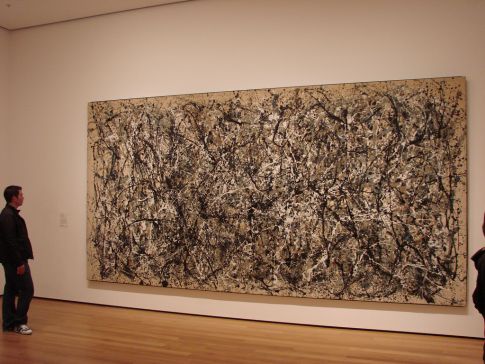
My taste in painting runs toward the abstract. Not everyone's first choice, I understand, but one that never had to be "sold" to me; I seem to have been born with an intuitive appreciation of large-scale gestural expressionism. I see a quality that I would label "beauty" immediately upon viewing certain paintings by Jackson Pollock and Robert Motherwell and Franz Kline. Beyond that, it's also clear when these painters were striving for the beautiful but failing to reach it, as in Pollock's early figurative work.
Because of that innate response, the famous "difficulty" of such canvases has never troubled me, and I did not fall into any of the too-easy traps that keep people away from modern art ("Anybody could do that," "My five-year old could do that," "He's laughing all the way to the bank," and so on). I wouldn't necessarily want to argue the merits of a Cy Twombly triptych in a formal way - though I think I could -- but fortunately, there's no need to. When a painting, even a difficult painting, is beautiful, I can just see it.
Not so in mathematics. Thanks to whatever genetic arrangement decides these things, my brain has never been naturally attuned to an appreciation of the logical relationships among numbers. Here, there seems to be an inverse correlation between the difficulty of the subject matter and my recognition of its aesthetic potential. On occasion I suspect I have glimpsed mathematical beauty (my first intuition of what makes certain statements axiomatic within their formal domains, for example) or the beauty of particular scientific theories (the way time dilation can be derived from nothing more than geometry and algebra). These experiences felt, in a particular way, like piercing the veil between suspicion and Truth. But, not being favored with a mathematical mind, this kind of aesthetic is largely beyond my ken.
Yet again and again when interviewing physicists I have heard people use the criterion of Beauty to describe not only what they are seeking, but how they know when they are getting close. Two models equally well describe a certain particle interaction; as yet we can't achieve high enough energies to disconfirm either one; from a purely theoretical standpoint, either stands as great a chance of being correct. (By "correct" I mean, perhaps naively, that one model accords more closely with the patterns that actually adhere in nature.) But the physicist will tell me he or she is deeply suspicious of model A because it is "ugly"; or much more interested in model B because it shows a certain "beauty." If you are a physicist, or a mathematician, or spend time around such people, you have heard this said - or you have experienced it yourself.
What could this quality of Beauty possibly be? Can it be quantified in some way, so that objective debate could take place over the merits of competing theories based on their Beauty? Surely not. And yet the invocation of Beauty is no fluke; too many scientists have referred to it, in my experience, for it to be mere shorthand for "personal whim" or "subjective preference." Yet what else could it be?
Here's Steven Weinberg from *Dreams of a Final Theory*:
"There is further reason for optimism in the peculiar fact that progress in physics is often guided by judgments that can only be called aesthetic. This is very odd. Why should a physicist's sense that one theory is more beautiful than another be a useful guide in scientific research? There are several possible reasons for this, but one of them is special to elemental particle physics: the beauty in our present theories may be 'but a dream' of the kind of beauty that awaits us in the final theory."
Could it be . . . to posit an answer to my own rhetorical question . . . that something like Plato's scheme really does exist in nature, and the True is equivalent to the Beautiful? (Philosophers: I recognize that statement is only "something like" Platonic Realism.) Could it be, that is, that the closer we get to the TOE, the more beautiful our models inevitably become . . . because ultimate Truth is ultimate Beauty?

A final theory that is merely a mathematical curiosity would be a grave disappointment to many. And many more would be deeply suspicious that we really had the TOE if it exhibited not only symmetry but something like a profound excellence, even loveliness. To those who know science deeply, I am persuaded, bland math and cumbersome theorizing just don't seem *true*.
And yet nature is under no a priori obligation to manifest a single, coherent deep structure -- to say nothing of one that triggers ecstasy in a certain hominid brain at a certain point in its evolution. How can such a criterion as the Beautiful be justified?